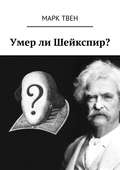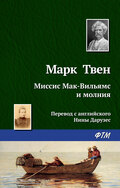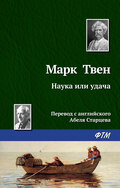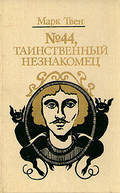
Марк Твен
Приключения Тома Сойера / The Adventures of Tom Sawyer
Chapter II
Saturday morning came, and all the summer world was bright and fresh. There was a song in every heart and a smile on every face.
But Tom was not very happy when he appeared in the street with a bucket of whitewash and a brush with a long handle. When he looked at the fence, so long and high, he felt depressed. Sighing, he dipped his brush and passed it along the top plank; repeated the motion; did it again; compared the insignificant whitewashed streak with the enormous continent of unwhitewashed fence, and sat down in the shade, discouraged.
Then he saw Jim, a slave boy, who was running out of the gate with a bucket. Tom himself had always hated bringing water from the town pump. But it seemed better than whitewashing. Tom said:
“I say, Jim, I’ll bring the water if you whitewash a part of the fence.”
Jim shook his head and said:
“I can’t, master Tom. Your aunt said you had to do it all. She’ll be angry if she learns that I helped you.”
“Oh, never you mind what she said, Jim. That’s the way she always talks. Gimme the bucket—I will be gone only a minute. She won’t ever know.”
When the boys noticed Aunt Polly coming out of the house Jim ran away with his bucket and Tom got back to whitewashing[6]. But his energy did not last. He began to think of the fun he had planned for this day. He got out his wealth out of his pocket and examined it—bits of toys, marbles, and trash; enough to buy an exchange of work, maybe, but not enough to buy even half an hour of pure freedom.
At this dark and hopeless moment he found a way out.
He took up his brush and went to work. Ben Rogers—the very boy, of all boys, whose ridicule Tom had been dreading—was walking along the street eating an apple. From time to time he produced melodious sounds: ding-dong-dong, ding-dong-dong, for he was impersonating a steamboat[7]. As he came closer, he called:
“Tom!”
No answer. Tom was whitewashing the fence; he surveyed his last touch with the eye of an artist, then gave his brush another gentle sweep and surveyed the result, as before. Tom’s mouth watered for the apple, but he continued working. Ben said:
“Hello, old chap!”
Tom turned to Ben.
“Why, it’s you, Ben! I didn’t notice you.”
“I’m going swimming. Don’t you wish you could? But of course you’d rather work—wouldn’t you? Course you would!”
“What do you call work?”
“Why, isn’t THAT work?”
Tom continued his whitewashing, and answered carelessly:
“Well, maybe it is, and maybe it isn’t. All I know is it suits Tom Sawyer.”
“Don’t say you LIKE it. I won’t believe you!”
The brush continued to move.
“Like it? Well, does a boy get a chance to whitewash a fence every day?’
That put the thing in a new light. Ben stopped biting his apple. He was watching Tom’s every move and was getting more and more interested. At last he said:
“Tom, let ME whitewash a little.”
Tom considered it, and then said:
“If it was the back fence I wouldn’t mind and Aunt Polly wouldn’t. But it’s the front fence; it must be done very carefully. There isn’t one boy in a thousand, maybe two thousand, that can do it the way it should be done.”
“Oh, let me just try. Only just a little. I’ll give you the core of my apple[8].”
Tom considered it. He said:
“No—no—It wouldn’t do, Ben. You see, Aunt Polly’s awful particular about this fence—right here on the street, you know—but if it was the back fence I wouldn’t mind and _she_ wouldn’t. Yes, she’s awful particular about this fence; it’s got to be done very careful; I think there ain’t one boy in a thousand, maybe two thousand, that can do it the way it’s got to be done.”
“No—is that so? Oh come, now—lemme just try. Only just a little.”
“Ben, I’d like to, but Aunt Polly—well, Jim wanted to do it, but she wouldn’t let him; Sid wanted to do it, and she wouldn’t let Sid. If you do a bad job—”
“I’ll be just as careful. Now lemme try. Say—I’ll give you the core of my apple.”
“No, Ben, I’m afraid—”
“I’ll give you ALL of it!”
Tom gave the brush to Ben with reluctance in his face, but cheerfulness in his heart . And while the boy worked and sweated in the sun, the retired artist sat on a barrel in the shade close by, dangled his legs, ate his apple, and planned. By the time Ben got tired, Tom had traded the next chance to Billy Fisher for a kite; and when he finished, Johnny Miller bought in for a dead rat and a string to swing it with—and so on, and so on, hour after hour. By the afternoon, Tom had become a wealthy boy. Besides the before mentioned things, he had twelve marbles, a piece of blue bottle-glass to look through, a key that wouldn’t unlock anything, a tin soldier, a kitten with only one eye, the handle of a knife, and a lot of other valuable things.
He had had a nice, good, time, plenty of company—and the fence had three coats of whitewash on it[9].
Tom said to himself that it was not such a hollow world, after all. He had discovered a great law of human action, without knowing it—namely, that in order to make a man or a boy want something, it is only necessary to make it difficult to obtain.
Chapter III
Tom came to the living-room which was their bedroom, breakfast-room, dining-room, and library at the same time. Aunt Polly was sitting by an open window. She was sure that Tom had left long ago, and she was surprised at seeing him.
“May I go and play now, aunt?” he asked.
“What, already? How much have you done?”
“It’s all done, aunt.”
“Tom, don’t lie to me—I can’t bear it.”
“I ain’t, aunt; it is all done.”
Aunt Polly went out to see for herself. When she found the whole fence whitewashed thoroughly, her astonishment was almost unspeakable.
She said:
“So, you can work when you decide to do so, Tom.” And then she added: “But you seldom feel like working[10]. Well, you can go and play.”
She even gave him an apple as a reward.
Tom went out of the house and hopped the fence. He walked around the block, and eventually came into an alley that led by the back of his aunt’s cow-stable. He was out of the reach of capture and punishment, and quickly walked toward the public square of the village, where two “military” companies of boys had met for conflict. Tom was General of one of these armies, Joe Harper, his friend, was the General of the other. These two great commanders sat together on the side and gave orders to others. Tom’s army won a great victory, after a long and hard-fought battle. Then the dead were counted, prisoners exchanged, the terms of the next disagreement agreed upon, and the day for the necessary battle appointed; after which the armies marched away, and Tom went towards home.
As he was passing by the house where Jeff Thatcher lived, he saw a new girl in the garden—a lovely little blue-eyed creature with yellow hair plaited into two long-tails, white summer frock and embroidered pantalettes. The fresh-crowned hero fell without firing a shot. A certain Amy Lawrence vanished out of his heart and left not even a memory of herself behind. He tried to win her over for a month; she had confessed hardly a week ago; he had been the happiest and the proudest boy in the world only seven short days, and here in one instant she had gone out of his heart like a stranger.
He looked at the new girl, till he saw that she had discovered him; then he pretended he did not know she was present, and began to “show off” in all sorts of absurd boyish ways, in order to win her admiration. Although the girl seemed not to pay attention, she threw a flower to him just before she went into the house.
Tom tried to act indifferent, but then he ran and took the flower between his toes when he was sure that the girl was gone.
He stayed around the house for the rest of the evening, hoping to see more of the girl, but she did not return, so he went back home.
He was in such a good mood that his aunt wondered “what had got into the child.” He took a good scolding about clodding Sid, and did not seem to mind it in the least. He tried to steal sugar under his aunt’s very nose, and got hit over his knuckles for it. He said:
“Aunt, you don’t whack Sid when he takes it.”
“Well, you’d be always into that sugar if I weren’t watching you.”
She stepped into the kitchen, and Sid, happy in his immunity, reached for the sugar-bowl. But Sid’s fingers slipped and the bowl dropped and broke.
That put Tom in a good mood. He said to himself that he would not speak a word, even when his aunt came in, but would sit perfectly still till she asked who did the mischief; and then he would tell.
When the old lady came back and saw the broken bowl she instead struck Tom! He cried out:
“Hold on, now, what are you belting me for?—Sid broke it!”
Aunt Polly paused. But when she got her tongue again, she only said:
“Umf! Well, you probably deserved that anyway, for all the mischief you’ve done.”
Then she felt sorry, and wanted to say something kind and loving; but thought that this would mean she admitted being wrong, and discipline forbade that. So she kept silence.
Tom sulked in a corner. He knew that in her heart his aunt loved him, but he refused to acknowledge it. He pictured himself lying sick unto death and his aunt bending over him asking for a forgiving word, but he would turn his face to the wall, and die with that word unsaid. Ah, how would she feel then? And he pictured himself brought home from the river, dead. How she would throw herself upon him, and how would she cry! But he would lie there cold and white and make no sign. All of this put him in such a melancholy mood that he walked out at one door and into the street.
He wandered for a bit. He saw a log raft in the river, and sat down on its outer edge and contemplated the dreary vastness of the stream. Then he thought of his flower.
He got it out, looked at it, and it improved his mood. He wondered if she would pity him if she knew? Would she cry? Or would she turn coldly away like all the hollow world?
This picture brought such an agony of pleasurable suffering that he thought about it again and again. At last he rose up sighing and walked away.







